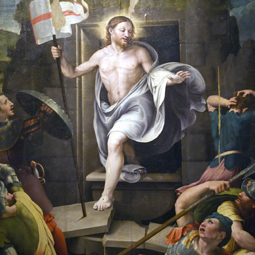Christ's Triumph
The Transformative Power of Our Savior's Resurrection: April 8 issue Easter column

Many modern scholars have questioned the fact of the physical resurrection of Christ.
There are Catholic theologians who maintain that if the body of Jesus were found in a tomb in Israel today that this would not shake their faith in the Resurrection.
For some, the only objective experience of the risen Lord is St. Paul’s on the road to Damascus.
This is not only alarming — but completely contrary to both the Scriptures and Tradition, though it comes from a modern European philosophy, that of Immanuel Kant.
Kant did not think one could come to truth through sense experiences, especially truths about things like God. So he “reformed thinking” by redefining truth as the correspondence of the thing to the idea or human need, not the correspondence of the idea or need to the thing.
He made all truth relative.
Those influenced by this way of thinking would maintain that the doctrine of the resurrection of the dead does not involve physical bodies living again, but was produced from the faith of the apostles to make sense of a life seemingly made meaningless by death on a cross: Christ is risen because the community needed him to be alive again.
The necessity of resurrection for human fulfillment is a truth that can be known even by human reason. If man must by nature have both a body and a soul, and if man can know that the soul is immortal, then it follows the body should not die. However, it does die.
Also, there is no power in the human soul or in the human body to make it live forever. The problem of human life is left in a box canyon then, with no solution, by human thought.
When Christ rises from the dead, the solution to this difficulty becomes clear: The fact of Jesus rising gives the final solution to the problem of human life. Death is not natural to man, but a result of sin.
The soul was meant for God, and the body should live forever and reflect the glory of a soul that sees God.
Jesus’ risen body was certainly like this. It is certainly flesh, as Christ showed in eating a piece of fish and inviting Thomas to put his finger in the marks of the wounds. It is his body because of the wounds.
Yet it has a whole new relation with the soul, as it can pass through walls. Jesus stood in the Upper Room despite the locked doors. As Paul declares: “If Christ is not risen, your faith is in vain” (1 Corinthians 15:17).
In the Resurrection, “things of heaven are wed to those of earth and the divine to the human” (Exsultet, third edition of the Roman Missal).
This mystery is completed when Jesus, in his risen flesh, leaves the earth in the Ascension and becomes an image to us of final human fulfillment. We are to follow where he is gone.
His humiliation before human judges is reversed when he comes to judge the world. In this judgment, all creation will be assembled before Christ in his human nature, and as Matthew 25 recounts, he will separate the good from the wicked then. The standard will be how much they have loved from grace during this life in imitation of him.
In this Last Judgment, all the secrets, thoughts and sins of the whole human race will be proclaimed before the entire assembled creation. This will add to the glory of the just, even great sinners who have converted and contribute to the confounding of the wicked.
All this will be accomplished in his physical body. Catholicism is a fleshly religion, and the flesh of Christ is still necessary for each of us to experience the grace of the Holy Spirit, even though he has gone to heaven.
The fleshly mediation is also graphically shown in the necessity of the sacraments and the hierarchical Church led on earth by the Pope, Christ’s vicar.
Christ himself established both the sacraments and the Church as the extensions of his physical body throughout time and space, that each person, in his or her own time and place, might truly participate in his offering made once bloodily on the cross, but now renewed and made present every time the Mass is celebrated everywhere in the world.
There is a sense in which the end times are already upon us. This is not in the sense that there is a heaven begun on earth through some earthly system of human creation.
In the holy Mass, the holy Eucharist, the whole heavenly court becomes present on the altar because the body, blood, soul and divinity of Christ become present there. We too make the voices of this heavenly court our own, and the altar becomes heaven on earth during the sacrifice of the Mass.
In consuming other food, the food becomes us. With the Eucharist, we become the food, transformed to know as God knows and to love as God loves here on earth.
Christ as the Word made flesh enters our souls with his accepted sacrifice and transforms us to be like him.
“Into these mysteries, angels long to search” (1 Peter 1:12).
Dominican Father Brian Mullady has a doctorate in sacred theology.
He is a mission preacher and adjunct professor
at Holy Apostles College and Seminary in Cromwell, Connecticut.











